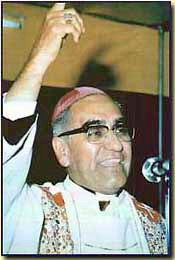Newsletter of 11/27/05
Somos el Cuerpo de Cristo
Thoughts from Some Fellow Parishioners of Holy Spirit
November 27, 2005
Tribunally Yours
Most everyone (except possibly a cave dweller) is aware that a Collegiate Tribunal of the Diocese of Brownsville determined the contract between the Parish and the United Farm Workers to be invalid. The Tribunal met in June and its decision was rendered on November 10th. A few facts about the workings of the Tribunal and the details of its decision might be worth pondering.
The Collegiate Tribunal is one the instruments of Canon Law, the law of the Church, and as such operates under legal theories and practices of ancient Roman law, which are very similar to how the law works in continental Europe (in civil law, the Napoleonic Code is its closest relative). The main difference that we, who live under the legal theories and practices of English Common Law, should be aware of is that most proceedings in Canon Law are not adversarial with proponents of two opposing views given equal footing before the court.
Instead, the Court seeks truth by asking questions of witnesses—there is no cross-examination, there is no opportunity for rebuttal, etc. There is only one side—that of the Court. In theory, there are no advocates of a particular position who participate in the proceedings; there is only the Tribunal and its witnesses.
This particular Tribunal’s judges were chosen by the Bishop, the list of witnesses was prepared by the Bishop (and initially included, from those who had a stake in the contract being determined valid, only Father Jerry Frank and Father Sam Arizpe), and the issues or questions to be heard by the Tribunal were chosen by the Bishop (and withheld from at least some of the witnesses beforehand).
After direct request to the Tribunal, and only at the last minute, one of the workers and the UFW representative were allowed to be witnesses. Each of those was told (by the diocesan spokesperson) that the issue at hand was whether contracts signed by a pastor outlived his tenure as pastor.
The Chair of the Parish Council at the time of the contracts being signed (and at the time of the workers’ being fired) was refused her request to be a witness—this request was denied in a flippant, arrogant, condescending letter that reveals the underlying hostility of the diocesan administration towards its workers and the very people of God they supposedly have a vocation to serve.
The Tribunal’s decision was not based on the appropriateness of unions for Church workers, it was not based on whether a contract outlasts the Pastor who signed it, instead it was based on the extremely narrow point of whether this particular contract was one that needed prior approval from the Bishop for the Pastor to sign it.
The Tribunal determined that such approval was needed since there is a Diocesan policy that any expenditure over $5,000 needs the Bishop’s approval. They reached this decision in spite of the fact that the $5,000 limit has never been applied to personnel issues in this Diocese.
In fact, employment contracts (well in excess of $5,000) are signed at the discretion of pastors all the time with no approvals from the Bishop required. In fact, a pastor can create new positions in his parish and fill them without even informing the Bishop, much less asking his permission. The $5,000 limit has always, in practice, been applied only to physical things (land, stuff, etc.), not people.
When asked whether the labor contracts at the other three parishes are now also invalid, the Diocesan spokesperson said “they are valid until someone would question their validity.” Sort of a legal Alice in Wonderland isn’t it?
Do The Right Thing
It is not clear whether there will be recourse in either the Church or the civil courts that will allow the Tribunal decision to be reversed. In a very real sense, that doesn’t matter because the basic, underlying situation which prompted all of this could be resolved in an instant by the Bishop’s retroactively validating the workers’ contracts (in all four parishes).
Legalisms shouldn’t command the stage as governing principles here. What should command the stage is following the Church’s teachings that advocate for workers’ rights to organize and following the Church’s teachings that direct employers to create a working environment that protects workers from exploitation, provides them due process, job security, and just compensation (including guaranteed pensions, etc.). It’s not hard, just read the Gospel, read Church social teaching, and do the right thing.
$$$$$ Update
According to the Sunday Bulletins, in the past six weeks parishioners have donated $9,463.97 less than the $87,000 the parish budget called for during that period. If the spending patterns of the last fiscal year have continued (13.4% over budget), then during this six-week period an additional shortfall of $11,653.56 was created.
This gives a total of $21,117.53 of red ink (versus budget) for the six-week period ending November 20th. Stretching that pattern for an entire year, the Parish would fall short by $183,018.59.
Why is it that there continue to be a collection for the building fund when the annual fiscal report indicated (as of June 30th) a balance of $56,319.13 in the fund and a loan balance of only $34,954.13?
Volunteers
The Reverend Monsignor was heard to say to a staff member that it is his goal that anything that can be done in the Parish by a volunteer will be. This brings to mind some thoughts from June 23, 2003:
The crux of the stated argument by both the bishop and Father Delgado is that a large number of professional staff "is ‘abnormal’ and that it interferes with opportunities for parish members to participate in the ministries of the parish by volunteering their time." The bishop goes so far as to say that "a professional staff is inimical to the spirit of the Vatican Council."
For this diocese, Holy Spirit is an abnormal parish. It is abnormal in its overall affluence…. But its true abnormality has been the extraordinary success of its liturgical life, its religious education, and its myriad ministries, both within and external to the parish community. All this work is overwhelmingly volunteer and its success is directly attributable to the skills of the professional staff in coordinating and managing the volunteer efforts.
Anyone experiencing life in the parish for even the briefest of weeks can see that the professionalism of the staff creates opportunities for parishioner involvement, it does not stifle them. Unfortunately, neither the bishop nor Father Delgado has had that experience, nor has chosen to talk to those who do. Déjà vu, all over again.
Banned in Boston
There is an organization out there that has taken a position completely at odds with the Church’s teaching—no, it’s not Call to Action, which has taken no formal position contrary to Catholic doctrine and morals—it is the Democratic Party with its stand on abortion. When are all the Democrats to be drummed out of Parish ministry?
Prepared by RGV Parishioners for Progress and edited by Jerry Brazier. Copy this, and pass it on to fellow parishioners, either by e-mail or paper. If you want an opportunity for prayerful discussion of these and other issues about the parish or have any other comments, please contact us at gbrazier@rgv.rr.com.
Note: If you would like to contribute a posting or a comment to this site, please send it to: kanickers@aol.com, with "Holy Spirit" in your title line. You may also e-mail this article to a friend simply by clicking on the little envelope below.








